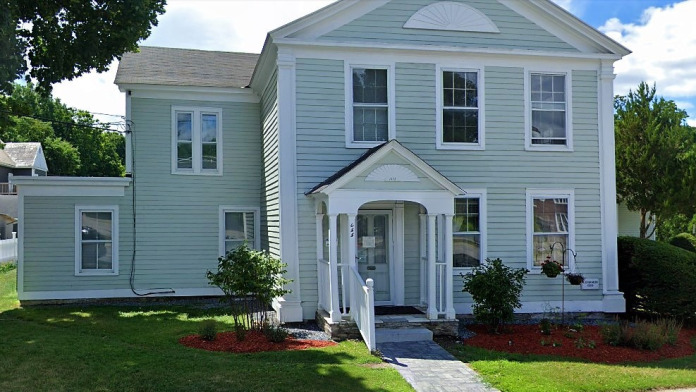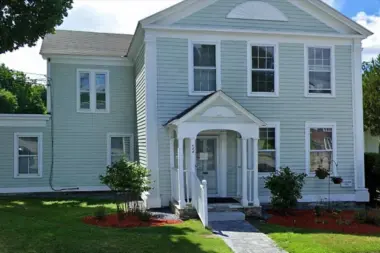About SaVida Health Bennington
SaVida Health Bennington is located in Bennington, Vermont. They provide outpatient services to adults aged 18 and over who are seeking support for substance use disorders (SUD). If transportation is an issue for you then many of the services have a telehealth option.
We’re impressed by SaVida Health Bennington’s positive reputation. Patients have expressed gratitude for the support received and note significant progress in their recovery journeys. The medical staff are commended for their unwavering support and commitment to patient care.
Payment and Insurance at SaVida Health Bennington
Medicaid and Medicare are accepted. Most commercial private insurance plans are accepted. Self-pay options are available. Fees may be adjusted based on income and household size using a sliding fee scale option.
SUD Services in Bennington, Vermont
We like their medication assisted treatment that utilizes FDA approved medications such as Suboxone, Vivitrol, buprenorphine and Sublocade to help you manage withdrawal symptoms and cravings. This can be a great option for you if you experience opioid or alcohol use disorder. You’ll be closely monitored to ensure the treatment is working and that you’re responding timely.
Other outpatient services include individual and group counseling sessions to address the emotional components that tend to accompany substance use.
Their intensive outpatient program provides a structured path with multiple weekly sessions, focusing on relapse prevention and life skills development. They also provide case management services such as housing assistance, employment training and transportation.
Their peer recovery coaches provide guidance and support which is a nice perk because they’ve been exactly where you are and can offer you personalized support.
Recovery and Recreation in Bennington
The facility is situated near Bennington Battle Monument. This is a historic site commemorating the Battle of Bennington that offers panoramic views of the area. There’s also the Bennington Museum that showcases regional art, history, and culture including Grandma Moses. The Green Mountain National Forest provides opportunities for hiking and connecting with nature.
Latest Reviews
Rehab Score
Gallery


Other Forms of Payment
Private insurance refers to any kind of healthcare coverage that isn't from the state or federal government. This includes individual and family plans offered by an employer or purchased from the Insurance Marketplace. Every plan will have different requirements and out of pocket costs so be sure to get the full details before you start treatment.
Self-pay involves paying for treatment out of your own pocket. You can use savings or credit, get a personal loan, or receive help from family and friends to fund your treatment. If you don't have insurance or your insurance plan doesn't cover a specific program, self-pay can help ensure you still get the care you need.
Medicare is a federal program that provides health insurance for those 65 and older. It also serves people under 65 with chronic and disabling health challenges. To use Medicare for addiction treatment you need to find a program that accepts Medicare and is in network with your plan. Out of pocket costs and preauthorization requirements vary, so always check with your provider.
Military members, veterans, and eligible dependents have access to specific insurance programs that help them get the care they need. TRICARE and VA insurance can help you access low cost or no cost addiction and mental health treatment. Programs that accept military insurance often have targeted treatment focused on the unique challenges military members, veterans, and their families face.
Medicaid is a state based program that helps lower-income individuals and families pay for healthcare. Medicaid covers addiction treatment so those enrolled can use their coverage to pay for rehab. When a program accepts Medicaid the client often pays very little or nothing out of their own pocket.
Addiction Treatments
Levels of Care
Outpatient Programs (OP) are for those seeking mental rehab or drug rehab, but who also stay at home every night. The main difference between outpatient treatment (OP) and intensive outpatient treatment (IOP) lies in the amount of hours the patient spends at the facility. Most of the time an outpatient program is designed for someone who has completed an inpatient stay and is looking to continue their growth in recovery. Outpatient is not meant to be the starting point, it is commonly referred to as aftercare.
Inpatient rehabs offer intensive clinical supervision and high-level care in alignment with the specialized needs of clients who are in early recovery, exiting detox, or experiencing crisis. Clients in inpatient care reside at the treatment facility with round-the-clock access to medical and mental health care. They engage in extensive addiction counseling, which may include family and group therapy sessions. Inpatient treatment also frequently involves recovery-focused life skills training. Many programs feature holistic therapies, such as meditation, as well.
Intensive Outpatient Programs (IOP) are for those who want or need a very structured treatment program but who also wish to live at home and continue with certain responsibilities (such as work or school). IOP substance abuse treatment programs vary in duration and intensity, and certain outpatient rehab centers will offer individualized treatment programs.
Rehab aftercare programs approach recovery as a life-long process that requires robust, individualized, and ongoing care. Clients in drug rehab aftercare have typically completed detox and intensive inpatient treatment and are weeks or months into their recovery journey. These programs are designed to promote clients' continued sobriety through a comprehensive portfolio of services aligned with the clients' evolving needs. Peer coaching, career counseling, and relapse prevention services are standard in these continuing care programs.
If you've completed an inpatient treatment program, it can be difficult to re-enter life right away with all the stresses and potential triggers. A sober living home in Vermont can help with this transition. While living there, you are free to work or attend classes and will be held accountable to sobriety and practicing recovery skills. Many residents stay in a men's or women's sober living home for six months or more.
Medical detox is the process of weaning your body off addictive drugs like alcohol, benzodiazepines, or opioids, under the 24/7 care of medical professionals. Often the first step in the recovery process, medically assisted detox takes place in an inpatient setting, where you will be closely monitored to ensure your maximum health and safety. Medications, like Suboxone or Vivitrol, may be administered if needed to alleviate any potential withdrawal symptoms.
Treatments
The goal of treatment for alcoholism is abstinence. Those with poor social support, poor motivation, or psychiatric disorders tend to relapse within a few years of treatment. For these people, success is measured by longer periods of abstinence, reduced use of alcohol, better health, and improved social functioning. Recovery and Maintenance are usually based on 12 step programs and AA meetings.
A person with substance dependence can achieve recovery through drug rehab in Vermont. Professional staff provide a combination of interventions that are designed to help you attain and maintain abstinence from drugs.
Many of those suffering from addiction also suffer from mental or emotional illnesses like schizophrenia, bipolar disorder, depression, or anxiety disorders. Rehab and other substance abuse facilities treating those with a dual diagnosis or co-occurring disorder administer psychiatric treatment to address the person's mental health issue in addition to drug and alcohol rehabilitation.
Opioid rehabs specialize in supporting those recovering from opioid addiction. They treat those suffering from addiction to illegal opioids like heroin, as well as prescription drugs like oxycodone. These centers typically combine both physical as well as mental and emotional support to help stop addiction. Physical support often includes medical detox and subsequent medical support (including medication), and mental support includes in-depth therapy to address the underlying causes of addiction.
Programs
Adult rehab programs include therapies tailored to each client's specific needs, goals, and recovery progress. They are tailored to the specific challenges adult clients may face, including family and work pressures and commitments. From inpatient and residential treatment to various levels of outpatient services, there are many options available. Some facilities also help adults work through co-occurring conditions, like anxiety, that can accompany addiction.
Young adulthood can be an exciting, yet difficult, time of transition. Individuals in their late teens to mid-20s face unique stressors related to school, jobs, families, and social circles, which can lead to a rise in substance use. Rehab centers with dedicated young adult programs will include activities and amenities that cater to this age group, with an emphasis on specialized counseling, peer socialization, and ongoing aftercare.
Serving in the military is both mentally and physically challenging, and can result in trauma that persists even after combat ends. Military programs are tailored to the specific and often complex needs of active duty personnel, veterans, and military families. Clients often access these programs through the U.S. Department of Veterans Affairs (VA).
Clinical Services
During cognitive behavioral therapy in Vermont, you may set SMART goals, engage in guided discovery, journal, and participate in cognitive restructuring. These activities help change patterns of thinking and behavior to address substance use and mental health disorders effectively.
For individuals who want to build skills related to emotional regulation and mindfulness, dialectical behavior therapy can be a good fit. This evidence based therapy helps you accept your emotions while also learning skills to manage them and create healthier patterns of behavior. Treatment occurs in group and individual formats.
Group therapy is any therapeutic work that happens in a group (not one-on-one). There are a number of different group therapy modalities, including support groups, experiential therapy, psycho-education, and more. Group therapy involves treatment as well as processing interaction between group members.
In individual therapy, a patient meets one-on-one with a trained psychologist or counselor. Therapy is a pivotal part of effective substance abuse treatment, as it often covers root causes of addiction, including challenges faced by the patient in their social, family, and work/school life.
The core principles of motivational interviewing are acceptance, compassion, partnership, and evocation. This collaborative process offers a nonjudgmental environment where the therapist expresses sympathy, highlights the client's strengths, and empowers them to explore necessary change.
During trauma therapy, you work through the traumatic memories of an event you witnessed or experienced in a safe and supportive place. Your therapist will provide you with the tools needed to process the trauma, which in turn reduces your symptoms and improves your overall mental health.
Couples therapy helps you address a wide range of challenges that can affect your relationship. These include finances, differing values, intimacy issues, children, addiction, and health issues. You'll meet with a counselor to learn how to navigate these issues in healthy ways.
Addiction impacts the entire family unit. Families in Vermont use family therapy to foster open communication and resolve the inevitable conflicts that were created by addiction. Therapists help to improve relationships and strengthen the recovery process for the individual struggling with addiction.
During life skills training in Vermont, you'll learn goal setting and develop the skills you need to reach those goals. The social and mental skills you develop provide a solid framework to support long term recovery.
Amenities
-
Residential Setting
-
Private Setting
Accreditations

The Substance Abuse and Mental Health Services Administration (SAMHSA) is a branch of the U.S. Department of Health and Human Services. Established in 1992 by congress, SAMHSA's mission is to reduce the impact of substance abuse and mental illness on American's communities.
SAMHSA Listed: Yes

State Licenses are permits issued by government agencies that allow rehab organizations to conduct business legally within a certain geographical area. Typically, the kind of program a rehab facility offers, along with its physical location, determines which licenses are required to operate legally.
State License: Vermont
Contact Information
655 Main Street
Bennington, VT 05201